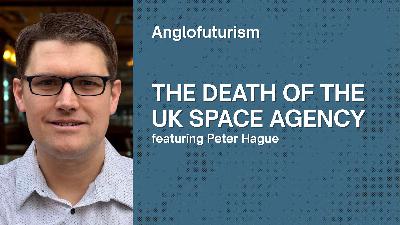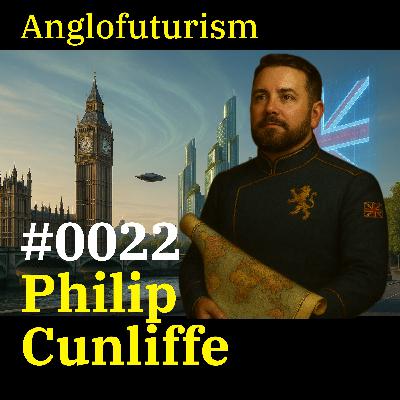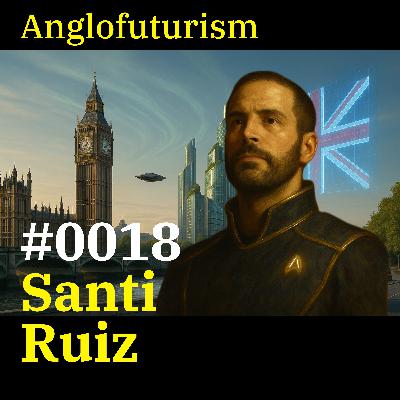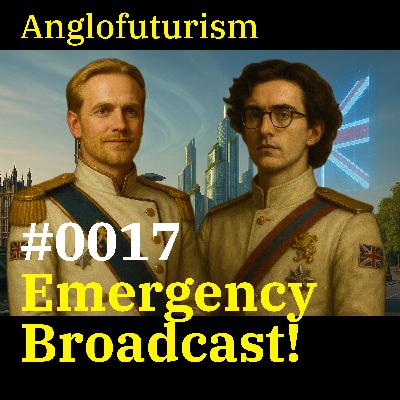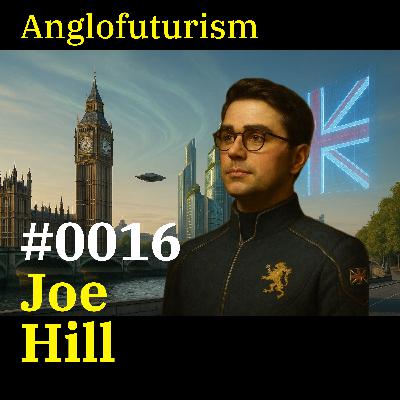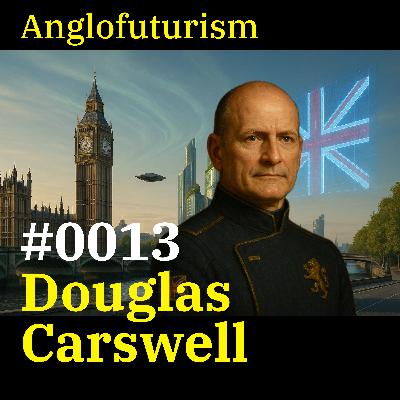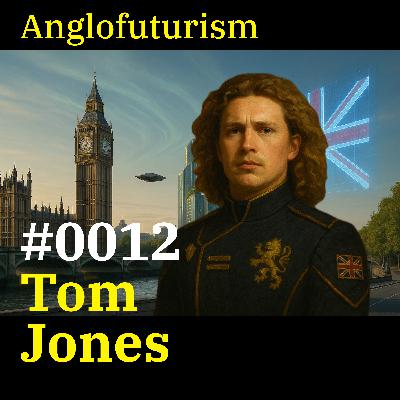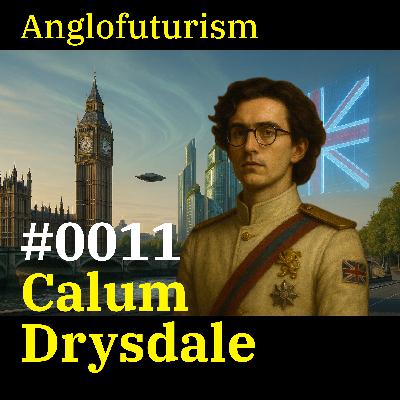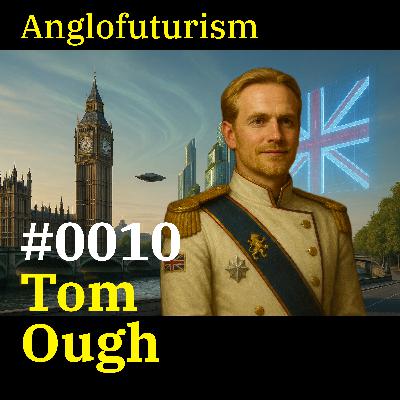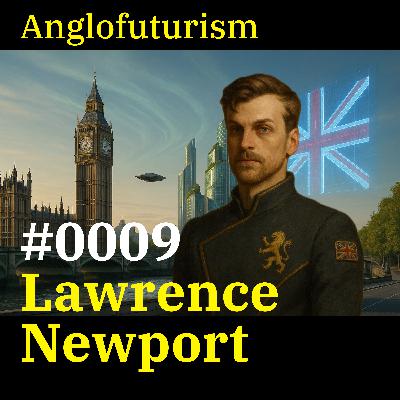Discover Anglofuturism Podcast
Anglofuturism Podcast

Anglofuturism Podcast
Author: Tom Ough and Calum Drysdale
Subscribed: 28Played: 438Subscribe
Share
© Anglofuturist Podcast
Description
27 Episodes
Reverse
Industrial policy researcher Rian Chad Whitton makes his second appearance to dissect Britain's manufacturing decline, arguing that energy costs and economic orthodoxy have systematically dismantled what was once the world's fourth-largest industrial base.Tom, Calum, and Rian on:* Why 1999 represented a high-water mark for British industry - the fourth-largest manufacturing base globally with functioning steel, chemicals, and automotive sectors, before China's rise blindsided everyone including FT columnists,* How Britain's "tolerance for lower margins" problem means we exit markets entirely while Germany and Japan fight to stay competitive - illustrated by ICI's dismantling versus Jim Ratcliffe's successful INEOS empire built from the wreckage,* The devastating impact of energy costs on heavy industry: 20% of gross value added for energy-intensive sectors, 80% for steel production, while competitors enjoy massive state subsidies that Britain refuses to match,* Why the government's £51 billion energy support budget (the size of the defence budget) still isn't enough to paper over the fundamental problem of expensive electricity and misguided net-zero policies,* Ryan's fantasy 50-year plan for industrial revival: import substitution for steel and cement, building the world's largest 200,000-ton forge press, and learning from Chinese entrepreneurs who consider profit margins above 5% "economic inefficiency,"* The irony that Britain followed American economic orthodoxy perfectly - green energy, liberal immigration, foreign direct investment - only to be mocked by Americans for becoming a "vassal state" that sucks at everything. Get full access to Anglofuturism at www.anglofuturism.co/subscribe
Space policy expert Peter Hague joins from his emergency shuttle to discuss Labour's decision to fold the UK Space Agency into a larger department, effectively ending Britain's independent space ambitions just as the new space age begins.In this episode:* Why the UK Space Agency's absorption into DSIT represents Britain "quitting before it started" - losing budget autonomy and direct ministerial access just when space is becoming strategically crucial,* The historical pattern of British space failures: from abandoning the successful Blue Streak rocket (which could have rivaled Atlas) to the disastrous Europa program where continental partners kept sabotaging British components,* Why the Apollo program wasn't popular at the time but became mythic afterward - and how political leadership means doing unpopular things that future generations will thank you for,* Peter's "Penny for Space" campaign: spending just 1% of government budget on space (compared to 33% on welfare) as a "civilizational pension" for Britain's future in the 22nd century,* The coming space revolution that will make 2029 politically embarrassing: private space stations, Indian human spaceflight, and potentially Chinese or American boots on Mars while Britain has no space program at all,* Why we need a new UK space agency focused on building rotating space habitats in Earth orbit - stepping into the gap as America abandons permanent orbital presence for lunar missions.Peter asked us to higlight the recent work of Progress in building a technology-forward Britain. We recommend trying out the excellent Nick, 30 ans simulator. Get full access to Anglofuturism at www.anglofuturism.co/subscribe
Tom and Calum reflect on 25 episodes of the podcast that allegedly influenced Robert Jenrick to declare himself an Anglofuturist, while grappling with accusations of dangerous nostalgia from Southampton academics.Tom and Calum on:* How Robert Jenrick's declaration that he's “what you would call an Anglo-futurist” at a Westminster nationalism conference proves their growing influence* Defending themselves against Francesca Melhuish's academic paper attacking the “nostalgic politics of Anglofuturism”* Why talk of British civil war misses the point - the real question is whether there's a genuine constituency for radical change beyond angry WhatsApp groups and hotel protests,* Tom's new book, and his journey from effective altruist malaria-net maximizer to someone worried about civilizational collapse,* The thrilling prospect of geoengineering our way out of climate change through stratospheric aerosol injection and iron ocean fertilizationThe Anti-Catastrophe League: The pioneers and visionaries on a quest to save the worldA new Elizabethan age: The Advanced Research and Invention Agency (ARIA) and the nostalgic politics of Anglofuturism Get full access to Anglofuturism at www.anglofuturism.co/subscribe
A bonus episode diving deeper into Alex Burghart's experience creating Britain's first government AI unit, from spotting benefit fraud to the bureaucratic battles that nearly killed innovation.Calum and Tom with Alex on:* The surprisingly mundane reality of government AI–not solving cancer, but automating correspondence, flagging outdated NHS prescriptions, and spotting benefit fraud patterns that human analysts miss,* How departments hoard data "like family silver" to maintain leverage over each other–and why even Dominic Cummings couldn't force the sharing needed for his famous "situation room" dashboards,* The shocking gaps in basic government knowledge: we don't know how many people live in Britain, can't get real-time data for PMQs, and the best population estimates come from supermarket footfall,* Why hiring top AI talent required stepping outside normal civil service pay bands–and how £150k salaries (still massive pay cuts for tech workers) bought world-class engineers motivated by mission over money,* The perverse incentives of civil service culture: brilliant specialists forced into management to advance, departments refusing to share data that could eliminate their jobs, and a system that selects for risk-averse mediocrity,* Alex's vision for the future of government: ruthlessly cutting non-priorities, automating everything possible, and building a "smaller, better qualified, better paid" civil service–plus AI judges for instant legal settlements. Get full access to Anglofuturism at www.anglofuturism.co/subscribe
Conservative MP Alex Burghart and AI expert Dr Laura Gilbert argue that Britain's mediaeval past holds the key to mastering its technological future–from Alfred's burghs to sovereign data centres.Calum, Tom, Alex, and Laura explore:* How Alfred the Great's response to Viking invasion mirrors today's AI challenge–using crisis as the moment to forge new order when "the metal is hot," creating institutions that lasted centuries,* Why the collapse of Roman Britain offers hope for our post-imperial moment: just as Alfred built something more durable than Rome from chaos, we can create lasting prosperity from current decline,* Laura's insider account of building i.ai within government–attracting world-class talent with the mission to save lives and money, while navigating civil service "antibodies against change" and demands for "Whitehall Sherpas,"* The case for sovereign compute power and data ownership as national security imperatives–why relying on foreign AI models could leave Britain vulnerable to future Donald Trump Jrs turning off access,* Alex's vision for technological Anglo-Saxonism: virtual reality mead halls where the nation's "Witan" assembles annually, plus genetically enhanced oaks growing fast enough to maintain our aesthetic inheritance,* Why the next government needs to break the bureaucratic paradigm that's paralysed Britain since 1990–and why Conservative experience of governmental frustration makes them uniquely positioned to "seize the liquid moment."Sovereignty, Security, Scale: A UK Strategy for AI InfrastructureProfessor James Campbell (historian)Clip from “Harold Godwinson” used with permission from The Skaldic Bard. Get full access to Anglofuturism at www.anglofuturism.co/subscribe
Political theorist Philip Cunliffe argues that globalism is dying and Britain has a rare chance to lead the world into whatever comes next - but only if it rediscovers what sovereignty actually means.Philip Cunliffe on:* Why we're witnessing the collapse of globalist political structures that layered transnational governance over democratic nation states,* How ruling elites from the 1980s onwards deliberately fragmented political power to escape working-class demands, creating the regulatory "blob" that can't build railways or defend territory but excels at shuffling PowerPoint decks,* The failure of populists like Trump and Meloni to break free from globalist institutions, despite their rhetoric - and why even "America First" gets sucked back into Middle Eastern quagmires,* Why Brexit was a precocious early move in this global transition, giving Britain unique advantages as other nations will "inevitably have to follow us down as globalism continues to decay,"* The case for "new nations" - not territorial breakups but politically renewed nation-states that can actually defend their interests, requiring proportional representation, ending devolution, and forcing politicians to think in terms of national interest rather than international virtue signaling,* How a revitalised Britain could seize unprecedented opportunities in a multipolar world without a single hegemon - if it's willing to focus on what sovereignty actually means.The National Interest: Politics After Globalization Get full access to Anglofuturism at www.anglofuturism.co/subscribe
Dan Tomlinson MP, Labour's official growth mission champion, boards the KC-3 to discuss what Britain needs to sacrifice for economic growth and whether we're still a country capable of big things.Dan Tomlinson on:* Why Britain has lost the ability to do "big and bold" things like the Apollo missions, trapped by endless processes, consultations, and judicial reviews that would make a modern space program impossible,* Testing Labour's growth priorities against various "sacred cows" - from building on the greenbelt (yes) to fracking and North Sea drilling (no) to social housing in central London (complicated),* Whether high immigration helps or hurts growth, arguing that the recent scale (equivalent to adding Leeds, Manchester, Sheffield and Liverpool combined) has unclear benefits for GDP per capita despite official studies,* His three-pillar growth strategy of stability, investment, and reform - particularly planning reform that could add £7 billion to GDP - and why he believes Chancellor Rachel Reeves has the right approach,* His vision for Britain in 50 years.Further readingDan asked us to share this clip of a happier time, when the country struggled under the weight of GP appointments that were simply too easy to obtain: Watch it on YouTube. Get full access to Anglofuturism at www.anglofuturism.co/subscribe
From the King Charles III Space Station, Tom and Calum welcome Alex Fitzgerald, founder of Isembard - a micro-factory startup that's building Britain's manufacturing future one CNC machine at a time.Alex explains how Britain's manufacturing crisis isn't just about big factories closing - it's about the hidden supply chain of small family-owned machine shops that actually make the parts for everything from F-35 jets to AirPods. With 95% of CNC machines owned by small businesses, and those business owners now retiring en masse, the West faces a manufacturing capacity cliff just as geopolitical tensions increase demand.“Fundamentally, how you build great product is having engineers ingest pain and then output product.”The episode explores:* Whether distributed manufacturing is more resilient than centralized factories* How Britain's hidden aerospace and defense supply chains actually work* Why small machine shops are the real manufacturing base, not big assembly plants* The role of risk capital in building trillion-dollar manufacturing businesses* How software and AI are transforming traditional machining and production* What young engineers can do to build world-changing manufacturing businessesFurther readingIsembard - Faster, Cheaper, Greener ManufacturingThe Manufacturing ManifestoCareers at Isembard Get full access to Anglofuturism at www.anglofuturism.co/subscribe
In this solo episode recorded from the King Charles III Space Station, Tom and Calum eat humble pie after their confident predictions about the Chagos Islands deal being shelved proved spectacularly wrong. Within days of the last Britannia dispatch, Keir Starmer confirmed the handover to Mauritius would proceed, decisively answering the question "Is Keir Starmer an Anglofuturist?" with a resounding no.This giveaway fits into a broader pattern of Britain's political elite prioritizing abstract internationalist ideals over their inheritance from previous generations. Tom and Calum draw parallels between the Chagos surrender and the potential handover of the Elgin Marbles, arguing that Britain's custodians are conducting a "national fire sale" that makes the country look weak to international observers.The episode explores:* Whether Britain's political class has lost the Burkean sense of obligation to past and future* How the country has become "brittle" with single points of failure in central government* The need for local organization and civic engagement when the state fails* Why planning reform is essential but constantly undermined by the "vegetable lobby"* The demographic realities that make military mobilization increasingly difficult Get full access to Anglofuturism at www.anglofuturism.co/subscribe
Santi Ruiz is a policy researcher at the Institute for Progress and host of the Statecraft newsletter and podcast. He's one of the editors of the Techno-Industrial Policy Playbook, a comprehensive strategy document produced by three American think tanks to help the US compete with China's manufacturing dominance. The playbook outlines concrete policy proposals across frontier science, energy abundance, and national security—from creating special compute zones to reforming naval shipbuilding and accelerating geothermal development.The Society for Technological Advancement (SoTA) is organising a hackathon on 31st May and 1st June focused on geoengineering and weather control. Click here to find out more.Episode outline* How China's 230x shipbuilding advantage over America represents an existential threat to Western naval power* The X-Labs proposal to fund cutting-edge research institutions outside traditional universities using flexible block grants* Special compute zones that would fast-track energy infrastructure for AI development in exchange for security commitments* Why America's Loans Programs Office has funded every nuclear plant built this century and shouldn't be dismantled by DOGE* How regulatory carve-outs for geothermal energy could unlock abundant clean power using proven oil and gas drilling techniques* The critical minerals challenge where China could crash markets to destroy American mining operations* Why American naval shipbuilding fails because design is outsourced instead of done in-house like it used to be* Whether Britain should be America's lapdog or develop independent techno-industrial capacity focused on European threats* How elite consensus matters more than popular mobilisation for implementing transformative policy changes* The difference between financialisation that enables productive investment versus financialisation that replaces itMentioned in this episode:The Techno-Industrial Policy Playbook: How to Kickstart America's Techno‑Industrial RenaissanceStatecraft on SubstackWhy FORGE Works by Tom Ough for IFP Get full access to Anglofuturism at www.anglofuturism.co/subscribe
A break from our regular schedule to bring you urgent news on the Chagos Islands and a sudden change for Britain’s immigration policy.We’re back with the regular podcast on May 28th when we’ll be talking to Alexander Fitzgerald, industrialist and Founder/CEO of Isembard. Get full access to Anglofuturism at www.anglofuturism.co/subscribe
Joe Hill is Director of Policy at Reform and founder of the Greater London Project, a community initiative focused on London's future. A former Treasury civil servant with experience across government departments, Joe has become a leading critic of what he calls "everythingism"—the dysfunctional tendency to make every policy about every other policy, everywhere, all at once. His influential essay on this concept has gained significant traction in policy circles, offering a framework for understanding why British governance has become increasingly ineffective despite ever-expanding regulations and procedures.Calum and Tom talk to Joe about:* How "everythingism" manifests in absurd policy decisions like rejecting a nuclear power plant to protect Welsh language or requiring fish discos for reactor cooling systems* The rise of plus-oneism—how individual policy advocates each adding "just one more requirement" creates an unmanageable bureaucratic morass* Why statutory requirements like the Equalities Act and Climate Change Act have created unintended veto points that prevent sensible decision-making* The failure of technocratic governance through quangos and how these arms-length bodies have become accountability sinks* How social value procurement requirements waste billions by forcing contractors to prioritise secondary goals over core objectives* The paradox of parliamentary sovereignty—how ministers have the power to cut through bureaucracy but lack the knowledge or will to do so* Why successful government initiatives like the vaccine task force only work by exempting themselves from normal rules* The path forward: restoring personal accountability, rejecting everythingist thinking, and accepting that good policy requires difficult trade-offsSee below for transcript and further reading. Listen on Apple Podcasts and Spotify.Further Reading on Everythingism and British Policy ReformIf you enjoyed this episode with Joe Hill discussing the crisis of everythingism in British governance, here are some recommended resources to explore these topics further:"Everythingism" by Joe Hill - The original essay that defines and analyses the concept of everythingism in British policymaking.Greater London Project - Joe's community initiative and Substack focused on building a liveable future for LondonReform research - Various papers on planning reform, regulatory burden, and state capacityDan Davies on “The Unaccountability Machine” - Dan Davies explores the concept of unaccountability sinksBooks"The Uses of Knowledge in Society" by F.A. Hayek - Foundational text on the limits of centralised decision-making"The Blunders of Our Governments" by Anthony King and Ivor Crewe - Analysis of systematic failures in British government decision-making"The British Regulatory State" by Michael Moran - Academic examination of how Britain became a hyper-regulated society"Seeing Like a State" by James C. Scott - Classic work on why certain schemes to improve the human condition have failed"Simple Rules for a Complex World" by Richard Epstein - Legal scholar's argument for simplicity in law and regulation"The Death of Common Sense" by Philip K. Howard - How bureaucratic rules have replaced human judgment in governance"Why Government Fails So Often" by Peter Schuck - Analysis of the structural reasons for policy failure Get full access to Anglofuturism at www.anglofuturism.co/subscribe
Marc Warner is CEO and co-founder of Faculty, a British AI company that partners with organisations to deploy artificial intelligence in the real world. After beginning his career in quantum physics research at UCL and Harvard, Marc shifted his focus to AI, believing it would be the most important science of the 21st century. Faculty first gained prominence for its fellowship program that helps PhD graduates transition into commercial data science, and later for its critical work with the NHS during the COVID-19 pandemic, using AI to predict hospital demand and resource allocation.Calum and Tom talk to Marc Warner about:* Britain's missed opportunities in cloud computing and foundation models, and what can still be done to ensure technological sovereignty* The challenges of aligning AI with human values and controlling frontier models as systems become increasingly powerful* Faculty's crucial role during COVID-19, developing world-leading predictive models that helped allocate healthcare resources and save lives* The bureaucratic obstacles that hinder innovation in government, including procurement rules that favour foreign tech giants over British companies* How Faculty evolved from an educational fellowship into one of the UK's leading AI companies helping organisations bridge the gap between data and effective decision-making* How AI's economic transformation could create both extraordinary wealth and potential risks, requiring thoughtful governance approaches Get full access to Anglofuturism at www.anglofuturism.co/subscribe
Josef Chen is the founder of KAIKAKU, a London-based company developing automation technology for restaurants. A former Imperial College student, Chen created his first Bitcoin faucet at age 13 and previously worked as the first intern at Bitpanda (Austria's first unicorn startup). After growing up working in his parents' Chinese restaurant from age six, Chen has now returned to the industry with a mission to transform it through robotics and technology.Calum and Tom talk to Josef Chen about:Josef's remarkable journey from peeling potatoes in his parents' Austrian restaurant at age six to founding a cutting-edge robotics companyHow KAIKAKU's "living laboratory" approach enables rapid hardware development and real-world testing of restaurant automationWhy specialised robots designed for specific tasks will outperform humanoid robots in practical applicationsThe widespread misallocation of engineering talent in Britain, with top graduates being lured into finance instead of building tangible solutionsHow restaurant automation can free staff from mundane tasks to focus on genuine hospitality and customer experienceJosef's vision for rebuilding Britain's engineering culture through initiatives like London Micro GrantsListen on Apple Podcasts, Spotify, and Substack. Produced by Aeron Laffere.Further readingSweetgreen’s S-1 Filing - Deep dive into a US tech-forward restaurant chain’s unit economics, vision, and automation strategyOcado’s AI-powered robotic arms: levelling up efficiency in online grocery and logistics - Case study of one of the few globally competitive UK hardware automation effortsNeko Health - Example of vertically integrated tech x real-world experience design, referenced by JosephLondon Micro Grants - A live initiative for empowering grassroots builders in the UK with small-scale funding Hosted on Acast. See acast.com/privacy for more information. Get full access to Anglofuturism at www.anglofuturism.co/subscribe
Douglas Carswell is a British politician who served as a Member of Parliament from 2005 to 2017, first as a Conservative before defecting to UKIP in 2014. A prominent Brexit campaigner and co-founder of Vote Leave, he now runs the Mississippi Center for Public Policy, a free-market think tank in the United States. Carswell is known for his advocacy of democratic reform, limited government, and economic freedom.Calum and Tom talk to Douglas Carswell about:Douglas's experience in Mississippi where free-market reforms have accelerated economic growth beyond the UK'sHow Britain's "Blairite Ascendancy" of 30 years has empowered unaccountable experts and regulatory bodies that block elected officials from governing effectivelyA detailed blueprint to restore executive power through orders in council, civil service reform, and judicial restraintProposals for public spending cuts of £170 billion and tax reductions including abolishing tariffs, lowering VAT, and reducing income taxesAddressing immigration through tighter controls and a voluntary "re-migration" program for non-contributorsThe cultural dimensions of Britain's troubles and the need to reassert Anglo-American values against cultural relativismHow these reforms could unlock British innovation and prosperity if leaders have the courage to endure short-term painListen on Apple Music, Spotify, and Substack. Produced by Aeron Laffere.Further readingMilestones: Nine steps to restore Britain - the essay outlining Douglas Carswell's detailed proposalsDominion: How the Christian Revolution Remade the World by Tom Holland - Mentioned by Carswell as influential to his understanding of Western valuesLooking for Growth campaign - A UK initiative advocating for policies to boost British economic growthWhy Nations Fail by Daron Acemoglu and James A. Robinson - Explores how political institutions impact economic successThe Sovereign Individual by James Dale Davidson and William Rees-Mogg - Examines the changing relationship between individuals and the stateEconomics in One Lesson by Henry Hazlitt - A classic text on free-market economicsState Capacity Libertarianism by Tyler Cowen - A blog post that reimagines libertarianism with a focus on effective government Hosted on Acast. See acast.com/privacy for more information. Get full access to Anglofuturism at www.anglofuturism.co/subscribe
We welcome Cllr Tom Jones to the KCIII. Tom serves as the Councillor for Scotton & Lower Wensleydale on North Yorkshire Council and is also an accomplished essayist.Cllr Jones joins Calum and Tom to discuss Anglofuturism, immigration reform, and how Britain can build a more productive, high-wage future:The origins and appeal of Anglofuturism as both an aesthetic and political movement responding to economic stagnation and declining living standards for young BritonsTom Jones' immigration paper "Selecting the Best" which argues Britain's reliance on mass immigration has created a low-wage, low-productivity economyHow "human quantitative easing"—importing cheap labor rather than investing in automation—has damaged British productivity and wagesThe car wash industry as a case study where cheap migrant labor replaced automated systems, creating exploitation and environmental problemsThe need to redirect state capacity toward strategic priorities like energy, manufacturing, and defence instead of dispersing resourcesHow greater automation and selective high-skill immigration could transform Britain into a high-wage economy capable of meaningful global influenceListen on Apple Podcasts or Spotify. Produced by Aeron Laffere. Get full access to Anglofuturism at www.anglofuturism.co/subscribe
The government is attempting to seal its giveaway of the Chagos Islands: a crucial archipelago in the Indian Ocean that was uninhabited when the Portuguese found them, but to which Mauritius – thousands of miles away – has made a specious claim. Extraordinarily, the British government is trying to indulge that claim – and to pay billions to continue to use the island that hosts a military base.The public has still not been given a satisfactory explanation for the giveaway, but the prime minister and the attorney general are thought to be of the view that Britain should obey a non-binding judgment by a partisan international court. That court is stacked with enemies of Britain... but the wallet inspector must be obeyed!Starmer and co are inches away from sealing the giveaway. But they reckoned without a ruddy young Anglofurist...Our very own Calum Drysdale!Calum and Lord Kempsell are together launching a judicial review into the putative giveaway. As news breaks of the judicial review, Tom and Calum discuss:The history of the Chagos IslandsThe bizarre logic of the governmentBritain's slender hopes of keeping the islandsHMG now has 14 days to respond to Calum and Lord Kempsell.Co-presenters: Tom Ough and Calum DrysdaleProducer: Æron Laffere Hosted on Acast. See acast.com/privacy for more information. Get full access to Anglofuturism at www.anglofuturism.co/subscribe
Calum and Tom on:- The history of British Antarctic exploration, from Captain Cook's mission to find Terra Australis to Shackleton's heroic survival after the Endurance was trapped in ice,- The geopolitical status of Antarctica, including Britain's territorial claims, the 1959 Antarctic Treaty that prohibits mining and militarisation, and how this could change after 2048,- The potential economic value of the British Antarctic Territory with its vast untapped resources (oil, gas, gold, and other minerals) and whether Britain should develop these resources before other nations claim them,Listen on Apple Podcasts or Spotify.Timestamps(00:00:00) - Introduction(00:01:30) - Antarctic Overview(00:04:16) - Historical Expeditions(00:12:50) - Heroic Age(00:31:19) - Sovereignty Issues(00:34:58) - Antarctic Treaty(00:36:49) - Resource Potential(00:54:25) - Future ProspectsTranscript00:00:00 - IntroductionTom OughWelcome back to the King Charles III Space Station. I'm Tom Ough.Calum DrysdaleAnd I'm Calum Drysdale. And if you, our listeners, have a telescope handy, you might be able to see our orbital space pub speeding southwards. Tom's behind the bar with one hand on our ship's wheels and the other one clutching a pint of gin.Tom OughListeners, you can't see the wheel but let me assure you that it's fashioned of beautiful English oak. A perfect replica of the wheel on HMS Victory.Calum DrysdaleTom, tell me where you're taking us.Tom OughWell, take a look through that Mullions porthole we put in the floor.Calum DrysdaleYep, taking a look.Tom OughWhat do you see?Calum DrysdaleI see the Falklands to the west. South Georgia… and I think that must be the South Sandwich Islands to the east. And now it's a long rocky peninsula.Tom OughYeah, an enormous apparently inhospitable peninsula.Calum DrysdaleAnd yet, something about it feels like home.Tom OughCorrect. As we sweep over this frozen continent, you will need no reminding that we are looking over the British Antarctic Territory.I will stop the ship here.00:01:30 - Antarctic OverviewCalum DrysdaleListeners, the view is stunning. Mile upon mile of white wilderness with the southern lights dancing above it. But Tom, maybe you can tell the listeners why you've brought us here.Tom OughWell, in short, what we're looking at is Britain's most valuable overseas possession. It could be the ticket to a new age of British prosperity, but it's under threat. And I think it's high time the country pay the matter some attention.Calum DrysdaleWell, I think it's something that we often forget. In that it's notable when, well or maybe not so notable to some people, when we try to rid ourselves of a few tiny atolls in the Indian Ocean. But actually the idea that we own a whole sort of section of a slice of a continent is maybe even less well known.Tom OughYeah and let's put this in perspective because the Chagos Islands, important as they are, are pretty minuscule in terms of land mass. Whereas the British Antarctic Territory is about eight times the size of Great Britain. It's insane, it's absolutely enormous and I think it's high time the country paid the matter some attention.Calum DrysdaleI think it's a bit risky Tom, isn’t it? Because the more attention we draw to our overseas territories the greater risk that the FCDO tries to find someone to foist them off on.Tom OughYeah I do worry about this because I think our claim to the Antarctic territory is in fact weaker than our claim to the Chagos Islands. So if you are listening and you are a senior civil servant at the FCDO then please, please avert your ears. But we are going to do an episode on the British Antarctic Territory nevertheless.Calum DrysdaleAnd our first one without a guest as seemingly Tom you are appointing yourself as our resident expert in the field.Tom OughWell there is a there is a criminal dearth of enthusiasts about the British Antarctic territory and I hope listeners will over the next half hour or so come to understand why I think there's a dearth.Calum DrysdaleWhilst most people are going out to the pub and talking to women, what on earth have you done spending your time worrying about the British Antarctic territory?Tom OughI for one got nerd sniped by the BAT as they call it last year when a big oil and gas discovery was made in the waters surrounding it and that led me to look into the BAT to which I had not given much thought prior to that. I discovered that it's enormous. It could be very lucrative. It's very exciting. It's a frontier. There's an amazing British history there as well. Perhaps we can get into all of those over this conversation.Calum DrysdaleAbsolutely. Do you want to start us off, Tom? Why on earth do we own a slice of this icy pie?00:04:16 - Historical ExpeditionsTom OughThere's a story to this which explains why we make the claim and I think we can get into that very soon. But I think it's worth winding back a little further because Antarctica has a fascinating recent history. Ancient and medieval cartographers hadn't been there. They nevertheless assumed that because of all the land mass that they're aware of north of the equator that there would be a continent in the far south to counterbalance that land in the north.So that's not really evidence in favour of Antarctica existing but nevertheless a picture began to build and we had 17th century sailors coming home with stories of islands of ice trailing through empty seas.Calum DrysdaleI mean the counterweight stuff is funny right because actually there isn't really a continent down there. Most of the land on the globe is concentrated to the north, there isn't reason really to go. I suppose the southern ocean around Antarctica is so empty that actually it's quite an inhospitable place for a wooden hulled ship to go.Tom OughThe seas around there are full of ice. They're very stormy. There's a prevailing west wind that rushes clockwise around the continent, dragging this very strong current along beneath. So not only is it freezing, it's also a very difficult place to navigate. So you can sort of understand why nobody went, why nobody discovered Antarctica sooner than they did. But nevertheless, people were interested.Calum DrysdaleAnd there was a sense that there had to be something there, right? Like you weren't just venturing out into open ocean.Tom OughWell, it's almost a little spooky because if you look at some of the old maps, they will even insert a large southern continent called Terra Australis Nondum Cognita, which means the southern land not yet known. And so we had French sailors, Dutch sailors, English sailors, including Francis Drake, who all went on a hunt for this continent. Didn't find anything.Calum DrysdaleYeah, and I think it's interesting you talk about this unknown southern and counterweight continent as I think Terry Pratchett put it. When I’ve heard that term, it's always been in reference to Australia, right? And Cook's expeditions down south.Tom OughYeah, well, Cook's a very important figure here. And the background is that in 1768, he was chosen to lead an expedition, chosen by the Royal Society, and its putative purpose was to observe the transit of Venus. And the idea was that if the transit of Venus were monitored from various points on the surface of the globe, the Astronomer Royal could accurately determine the distance between the planets. So that, as I say, was a putative purpose of that mission in 1768. And they do it, Cook’s in Tahiti, and then in June 1769, still in Tahiti, he opens an envelope which he carried with him on the ship all the way from London and it contains secret instructions from King George III.Calum DrysdaleI mean this is the sort of thing that you really you read about in kind of Cold War spy thrillers. The dour Soviet commander get into the northwest passage, opens the letters and ‘Bomb Vancouver immediately, Comrade Captain.’Tom OughBut it is in fact even better instructions for a second mission and the mission was to find this mysterious southern continent Terra Australis and claim it for Britain.Calum DrysdaleWhich we love to hear.Tom OughWe love it. Aso he sets out to find to find Terra Australis. He finds New Zealand, he finds Australia, and fabulously none of his crew dies of scurvy because he's a wonderful captain, but no Terra Australis. And so Cook returns home.Calum DrysdaleReally, so he was actually was always looking for Antarctica?Tom OughHe was looking for Antarctica, yeah. He was looking for an even more southerly continent. I’d say he did pretty well, I’d say he discovered a continent it just happened to be the wrong continent.I'm not saying we should tear down all the statues and burn all the stamps bearing his face.Calum DrysdaleSo Australia found, still impressive. We're not cancelling Cook yet.Tom OughYeah, I think we can give him a pass. But he does not give himself a pass. He goes on another expedition. And so this is in 1774 and his ships entered the Antarctic Circle several times and it was, as I say, incredibly cold there and this means that they had to turn back when they were merely a hundred and twenty one kilometres from Antarctica's coast.Calum DrysdaleAnd is this because it's so cold that the sailors can't survive or is it because almost like stepping onto a conveyor belt that they start just being whizzed around the globe sort of sent sent careening off westwards that they have to withdraw?Tom OughWell I think we can we can turn to his own diary entry, ‘I who had ambitions not only to go farther than anyone had done before but as far as it was possible for man to go was not sorry at meeting with this interruption.’ So I think we can infer from that that none of the crew wanted to be there. Even Cook, one of the most adventurous seafarers in British history was like, oh my God, I really want to warm my hands on a fire somewhere.Calum DrysdaleWell, it's like that, the clip of Fernando Alonso coming up behind Schumacher. I can't remember which Grand Prix it w
Today we welcome Lawrence Newport, darling of the British progress movement and bane of vicious dogs.Lawrence discusses:- His successful campaign to ban XL Bully dogs after identifying their disproportionate role in fatal attacks and overcoming resistance from animal welfare organisations,- His Looking For Growth initiative to streamline infrastructure development through legislation that bypasses regulatory hurdles for nuclear power, electricity cables, and data centres,- His Crush Crime campaign focusing on career criminals, highlighting the need for longer sentences for repeat offenders and addressing the breakdown in policing that has made certain crimes effectively legal,Listen on Apple Podcasts or Spotify.Timestamps(00:00:00) - Introduction(00:01:30) - ‘XL Bully’ Campaign(00:06:31) - Government Inertia(00:22:26) - Infrastructure Challenges(00:41:09) - Crime and Policing(00:52:26) - Crime Wave Causes(01:02:29) - Future Vision Get full access to Anglofuturism at www.anglofuturism.co/subscribe
Samo Burja is the founder and president of Bismarck Analysis, an industrial analysis and consulting firm studying failing organizations, and the author of "Great Founder Theory" which explores how exceptional individuals shape history by creating innovative institutions rather than merely steering events. He also chairs the editorial board of Palladium Magazine.Samo discusses:- How organisations decline when they shift goals to match diminished capabilities instead of pursuing bold visions, illustrated by NASA's evolution from space exploration to Earth observation- Why social technologies (like trust networks) are as crucial as material technologies in driving innovation and economic growth, with religious communities like Protestant merchants historically enabling trade through shared values- Britain's potential to regain global prominence through ambitious projects like nuclear energy, Antarctic resource development, and AI compute infrastructure, but only with live players who break from institutional scriptsListen on Apple Podcasts or Spotify.Timestamps(00:00:00) - Introduction(00:02:23) - Organisational Decline(00:07:29) - Energy Challenges(00:19:04) - NASA's Evolution(00:28:26) - AI and Society(00:37:29) - Social Technologies(00:56:19) - Britain's Status(01:05:45) - Political Opportunities(01:16:16) - Future Prospects Get full access to Anglofuturism at www.anglofuturism.co/subscribe
Comments
 United States
United States


